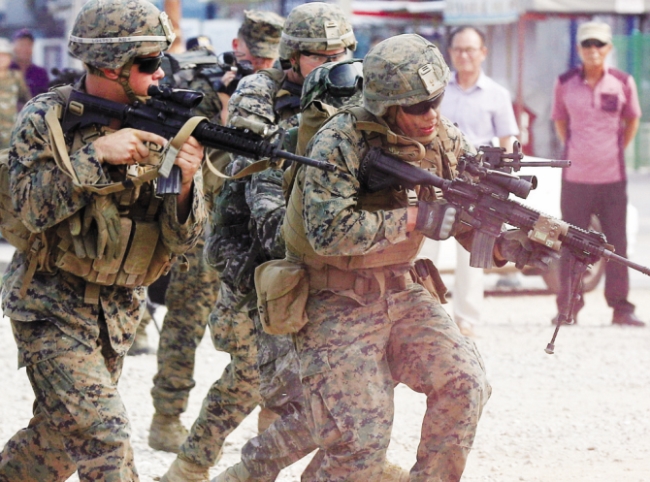한국이 처한 딜레마는 미국이 한국의 자체 핵 개발을 반대하는 상황에서 북한의 핵 위협에 대응하지 않고 김정은의 처분만 기다릴 수는 없는 현실
애국적인 한국인들이 왜 한국이 핵무장을 해야 한다고 생각하는지 그 이유를 아는 것은 쉽다. 북한의 핵위협을 미국이 어떻게 대응할 것인지 알 수 없기 때문이다. 버락 오바마 대통령을 비롯, 존 케리 국무장관 등 미국 최고 리더들은 한국 방어에 대한 불멸의 약속을 거듭 밝히고 있다.

전임 대통령인 조지 W. 부시, 빌 클린턴 모두 재임 당시 그렇게 말했고 미국의 모든 국무장관들이 한국에 왔을 때 역시 동일하게 말했다. 한국에 대한 미국의 이 약속은 계속 언급되었고 이제는 진부한 말이 되어버렸다.
이 말대로 미국은 한국을 과하게 보호하고 있는 것인가? 앞으로 4개월 뒤면 취임할 차기 미국 대통령 하에서 미국이 지금과 동일한 정책을 펼쳐나갈 것인지 어떻게 알 수 있는가? 현실적으로 말해 도널드 트럼프에 대해서는 크게 걱정하지 않아도 된다. 그는 한국과 일본에 주둔한 미군을 철수시키고 한국과 일본이 자주방어를 해야 한다고 말했다. 하지만 그는 대선에서 승리하지 못할 것이다.
당신의 정치 성향이 어떠하든 우리는 힐러리 클린턴이 차기 미국 대통령이 될 것으로 염두에 두어야 한다. 그녀가 국무장관 시절 한국에 왔을 때 그럴듯하게 말하는 것을 들었다. 그녀는 자기가 말해야 할 것을 정확히 말했고 박근혜 대통령 등 한국의 최고 지도자들과 입장을 나란히 했다. 하지만 그녀가 대통령이 되면 중동에 신경을 쓸 것이다.
물론, 미국은 전함과 일본에서 주로 날아오는 전폭기를 통해 이 지역을 방어하는 ‘핵우산’을 갖고 있다. 미국이 한국 내 미군기지에 핵무기를 배치할 것이라고는 생각하지 않는다. 조지 W. H. 부시 대통령은 재임 시절인 1991년 한국과 북한이 유명한 ‘화해와 불가침 및 교류·협력에 관한 합의’와 ‘한반도 비핵화에 대한 공동선언’을 체결하자 한국에서 핵무기를 철수시켰다.
미국의 핵우산과 한국의 핵무장
하지만 북한의 ‘친애하는 지도자’ 김정은이 미사일 실험 발사를 명령할 때마다 자랑하는 핵무기를 개발함으로써 휴지조각이 된 이 합의가 얼마나 의미가 없는 것인지 우리는 잘 알고 있다. 그렇다고 미국이 한국에 전략 핵탄두를 재배치할 것으로는 생각되지 않는다. 전폭기와 전함으로 방어가 가능하기 때문에 필요가 없는 것이다.
그러나 절대 그럴 일이 없겠지만 김정은이 핵탄두를 소지한 미사일로 한국 전역과 평택, 오산 등에 있는 주한미군 사령부를 실제로 공격한다면 미국은 한국을 방어하기 위해 빨리 올 수 있을까? 그렇게 되면 고고도요격미사일 사드(THAAD)는 한국에 배치되더라도 쓸모가 없다. 사드는 지상 150km 이상으로 날아오는 미사일들을 요격하는 것이지 북한이 다량으로 갖고 있는 중단거리 미사일을 겨냥한 것이 아니기 때문이다.
사실 미국의 대응은 예측불능이다. 우리는 미국이 한국을 방어하기 위해 얼마나 강력하게 나올지 알 수 없다. 우리는 미국이 지난 40, 50년 동안 한국이 자체적으로 핵무기를 개발하지 못하도록 모든 노력들을 해온 것을 잘 알고 있다. 그것은 이해될 만하다.
이 지역 내 모든 국가들이 핵무기를 보유하면 어떻게 되겠는가? 러시아와 중국은 이미 핵보유국이고 여기에 일본과 대만이 가세된다면 어떻게 될 것인가? 금세기에 유일하게 핵실험을 한 국가인 북한이 핵확산금지조약을 위반했을지라도 이 지역의 다른 나라들 모두는 이 조약을 지키는 것이 나은 것이 아닌가?
 |
| ▲ 북한이 실제 핵무기를 사용했을 때 미국의 대응이 불투명한 상황에서 한국의 선택은 무엇일까? 사진은 9월 8일 오전 인천시 월미도에서 진행된 한·미해병대원들의 인천상륙작전을 재연 연습./ 연합 |
한국의 딜레마
하지만 한국이 처한 딜레마를 생각해보자. 김정은이 핵과 미사일로 점유한 경쟁적 우위에 맞서 한국인이 이를 무력화할 수 있는 맞대응을 하지 못하고 가만히 앉아서 북한이 뭔가 하기를 기다리고만 있을 수 있겠는가?
도널드 트럼프가 한국은 스스로 방어하라고 말하면서 한국이 자체 핵무기를 보유해 북한에 맞서야 한다고 말한 것은 흥미로운 것이다. 이 말이 미국과 한국에서 퍼져나가자, 북한은 핵위협을 과장하고 있고 한국은 방어책을 고려하고 있다.
한국은 핵 기술에 관한 경험이 풍부하다. 한국에서 원자력은 한국에서 필요한 전기의 1/3을 만들어내고 있다. 향후 몇 년 안에 원자력은 한국 전체 에너지의 절반을 차지할 것이다. 대전에 있는 한국원자력연구소의 연구원들은 핵무기를 어떻게 만드는지 알고 있다. 하지만 그들은 미국의 제약과 핵확산금지조약 때문에 핵무기를 개발할 수 없다.
한국이 핵무기를 보유하는 것은 군사적인 면에서 중대한 조치이다. 핵무기는 북한이 먼저 핵 공습을 하지 않도록 억지할 수 있는 강력한 경고가 될 수 있다. 그럼에도 우리는 이 공포의 무기가 실전에서 사용되지 않기를 기도해야 할 것이다. 
번역 이상민 미래한국 기자 proactive09@gmail.com
Why South Korea May 'Go Nuclear' While Unsure About U.S. Promises
It's easy to see why patriotic Koreans think the Republic of Korea should develop its own nuclear weapons. Frankly, no one can be totally sure how the United States will respond to the nuclear threat posed by North Korea.
Sure, the highest American leaders, from President Obama to Secretary of State John Kerry, have repeatedly affirmed their undying commitment to the defense of South Korea. Sure, their predecessors, George W. Bush and Bill Clinton when each of them was president, and all the secretaries of state when they come to Seoul, say much the same thing. It's routine to hear their promises, promises and more promises of U.S. solidarity with South Korea.
But do they, as the saying goes, protest too much? And how can we be totally sure the U.S., under the next president, who will take office in a little more than four months from now, will want to go on with exactly the same policy.
Realistically, we probably don't have to worry too much about Donald Trump. He's said that he thinks the U.S. should pull its troops from Korea and Japan and let them both take care of their own defenses, but he's not going to win.
Whatever your politics, like it or not, we can pretty much count on Hillary Clinton as the next U.S. president. When she came here as secretary of state, I heard her talking a good game. She said exactly what she was supposed to say and got along fine with high-level Koreans, including President Park Geun-hye.
As president, though, she will be worried about the middle east. Yes, the United States does have a "nuclear umbrella" covering the region from warships and planes, mostly flying from Japan. No, the U.S. is not believed to keep nuclear weapons on its bases in South Korea.
George H.W. Bush, when he was president, ordered them withdrawn from South Korea in 1991 as North and South Korea were about to sign their famous "Agreement on Reconciliation, Non-Aggression, Exchanges and Cooperation" and "Joint Declaration on Denuclearization of the Korean Peninsula."
We all know how meaningless were those pieces of paper, which North Korea was already violating by developing nuclear weapons that "Supreme Leader" Kim Jong-un brags about whenever he orders a missile test. Still, it's not believed the U.S. has again placed nuclear warheads in the South. There's really no need to do that when it's got them close by, in the air and at sea, ready for use.
But would the U.S. really rush to South Korea if Kim Kong-un, God forbid, actually launched a missile strike, with nuclear warhead attached, in the general direction of a target in South Korea, perhaps the U.S. headquarters and base complex at Pyongtaek and Osan?
Those THAAD(Terminal High Altitude Area Defense) counter-missile batteries, if finally installed in the South, might not help at all. They're for defense against missiles flying 150 kilometers above the earth's surface, not for medium and short-range missiles that North Korea has produced in large numbers.
In fact, the U.S. response is unpredictable. We just cannot be sure how strongly the U.S. would rush to defend the South. We do know that the U.S. for the past four or five decades has done all possible to keep South Korea from going
ahead and developing its own nukes. That's understandable. What if all countries in the region had nuclear weapons? How about Japan and Taiwan in addition to Russia and China, which already have them? Would it not be far preferable for all sides to stick to the nuclear on-proliferation treaty even though North Korea, as the only country to test a nuclear warhead in this century, has specifically repudiated the entire agreement?
No doubt, but consider the South Korean dilemma. How can South Koreans sit back and simply wait for North Korea to "do something" without the certainty that the South also wields a counter-threat that should negate the competitive advantage that Kim Jong-un thinks he can gain with nukes and missiles? And why should the Seoul and Incheon metropolitan region always feel vulnerable not only to nuclear attack but to shots fired by North Korean cannon just above the North-South line?
It's interesting that Donald Trump, while calling for South Korea to defend itself, has said the South should have its own nuclear weapons while left to stand up to North Korea on its own. Those words resonate in both the U.S. and South Korea as the North hypes up the nuclear threat and South Korea considers the ultimate defense.
South Korea has had plenty of experience in dealing with nuclear technology. The South's nuclear power plants generate one third of the South's electrical energy needs. In the next few years, nuclear energy will account for 50 percent of South Korea's power. Physicists at the Korea Atomic Energy Research Institute in Daejeon know how to make nuclear warheads. They cannot do so, however, while constrained by the U.S. and also by the terms of the nuclear non-proliferation treaty.
For South Korea to "go nuclear" in the military sense would be a momentous step. A nuclear capability, however, would be a deterrent, a strong warning against North Korea not to risk a first nuclear strike. All the while, let us pray these fearsome weapons will never be used in actual combat. 
외부게재시 개인은 출처와 링크를 밝혀주시고, 언론사는 전문게재의 경우 본사와 협의 바랍니다.



미국은 한국의 안보자산이면서도 홀로서기에 문제가 되는 벽이기도 하다~
앞으로 미국과의 관계을 다양한 시각으로 바라볼 필요가 있으면 트럼프 현상은 중요간 포인트가 되는 시발점이라는 거다!